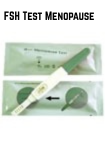Table of Contents
As women approach their 40s and 50s, understanding the hormonal changes in their bodies becomes essential – especially when symptoms of menopause start to appear. The FSH menopause test kit offers a simple, private and cost-effective way to monitor these changes from the comfort of home. By detecting elevated follicle-stimulating hormone (FSH) levels, the test provides insight into whether you may be entering perimenopause or menopause. Whether you’re seeking clarity on irregular periods or exploring fertility concerns, this non-invasive tool can guide your next steps. In this FAQ guide, we answer the most common and important questions surrounding FSH testing and its role in women’s health.
What is an FSH Menopause Test Kit and how does it help detect menopause?
The FSH Menopause Test Kit is a convenient home-use diagnostic tool designed to measure the level of follicle-stimulating hormone (FSH) in urine. FSH is a hormone produced by the pituitary gland that plays a vital role in regulating the menstrual cycle. As a woman approaches menopause, estrogen levels decline, prompting the body to produce more FSH in an effort to stimulate the ovaries. The test kit detects this hormonal shift by indicating elevated FSH levels, which are typically associated with perimenopause or menopause. It’s a helpful screening method for women experiencing early signs of hormonal transition such as irregular periods, hot flashes or mood swings. While the test is not diagnostic on its own, it serves as a reliable initial step in menopause detection from the comfort of your home.
When should you use an FSH test kit for accurate menopause tracking?
For reliable results, timing is essential when using an FSH test kit. If you still have a menstrual cycle, it’s best to take the test on the third day of your period, when hormone levels are most stable. For those with irregular or absent periods, it’s recommended to perform the test on any day, but then repeat it within 5–7 days for comparison. Using the first-morning urine sample increases accuracy due to higher hormone concentration. Many women choose to use the FSH menopause test kit when they experience symptoms like sleep disruptions, vaginal dryness or skipped periods. Testing at the right time helps distinguish between normal cycle variations and actual hormonal changes linked to menopause.

Can the FSH menopause test alone confirm menopause?
While the FSH menopause test can indicate that your body is experiencing hormonal shifts consistent with perimenopause or menopause, it is not enough to confirm menopause on its own. Menopause is officially diagnosed when a woman has gone 12 consecutive months without menstruation and other potential causes have been ruled out. FSH levels can fluctuate, especially during perimenopause and external factors like stress or medications can also influence results. Therefore, even if the FSH test kit shows elevated hormone levels, it’s advisable to consult with a healthcare provider for additional evaluations. The test serves as a preliminary screening tool, providing useful insights that can support further medical discussions.
What symptoms indicate it might be time to use an FSH menopause test?
Many women begin to consider using an FSH menopause test kit when they notice changes in their body that are typically associated with the onset of menopause. These symptoms may include irregular or missed periods, hot flashes, night sweats, mood changes, fatigue, vaginal dryness and reduced libido. If you’re between the ages of 40 and 55 and these symptoms persist, it could be an indication that your hormone levels are shifting. The FSH test provides a fast and private way to check for hormonal changes at home. Early detection can be especially beneficial for women considering hormone therapy or looking for answers about fertility or health risks related to menopause.
How accurate are FSH menopause test kits and what factors can affect results?
Most modern FSH test kits are designed to be highly sensitive and can provide more than 99% accuracy when used correctly. However, several factors can affect the test outcome. These include the time of day the test is taken, urine concentration and medications that influence hormone levels. For instance, hormone replacement therapy (HRT), birth control pills or fertility treatments can skew FSH readings. Hydration levels also matter – diluted urine can result in false negatives. To get the most accurate reading, always use the first-morning urine sample, follow the instructions carefully and repeat the test if your results are inconclusive or unexpected. Keep in mind that FSH levels naturally fluctuate, so consistent results over multiple days are more reliable than a single test.
How often should you repeat the FSH test for consistent monitoring?
Because FSH levels can vary throughout your menstrual cycle and even from day to day, a single test may not provide the full picture. For more consistent results, it is recommended to perform the FSH menopause test twice within a week, ideally at the same time of day using similar conditions. If your cycles are very irregular, you may choose to test multiple times across one or two months to observe trends. This approach can help provide a clearer understanding of your hormonal patterns. Tracking results over time is especially useful for women in perimenopause or those who are trying to determine if they are entering early menopause.
Can FSH testing help evaluate fertility or ovarian reserve?
Yes, while primarily used for menopause detection, an FSH test kit can also offer insight into a woman’s fertility status, especially when performed early in the menstrual cycle – specifically on day 3. Elevated FSH levels at this time may indicate diminished ovarian reserve, which refers to a lower number and quality of remaining eggs. This information can be valuable for women planning a pregnancy later in life or those undergoing fertility treatments. However, for a comprehensive fertility assessment, other hormone tests such as AMH (anti-Müllerian hormone) and a pelvic ultrasound are also needed. The FSH test alone is not sufficient for making fertility decisions, but it can be a helpful indicator when interpreted alongside other clinical evaluations.
What role does medication or lifestyle play in influencing FSH test results?
Medications, health conditions and even lifestyle choices can influence the accuracy of your FSH menopause test kit results. Hormonal contraceptives, HRT and certain fertility drugs can alter FSH levels, leading to false positives or negatives. In addition, chronic stress, recent illness and poor sleep can also impact hormone balance, affecting test readings. It is advisable to avoid testing during periods of acute illness or while taking medications that influence the reproductive system unless advised by a healthcare provider. Understanding these external factors helps ensure that your results are interpreted correctly and that you don’t draw premature conclusions based on a single test.
Is it safe and effective to use wholesale FSH test kits for personal health monitoring?
Absolutely. As long as the wholesale FSH test kits are designed for over-the-counter use and include clear instructions, they are both safe and effective for home use. These test kits function the same as individually packaged tests but are often more affordable when purchased in bulk, especially for clinics, pharmacies or community health programs. Many consumers choose wholesale FSH menopause tests for cost-saving reasons or to keep extras on hand for future testing. When selecting a wholesale option, make sure the product is easy to use, has a reasonable shelf life and provides reliable results when used according to instructions.
What should you consider when selecting an FSH test kit for personal use?
When choosing an FSH test kit, consider factors like ease of use, clarity of instructions, result interpretation format (e.g., line-based or digital) and packaging quantity. When sourcing from a wholesale FSH test kit supplier, ensure the kits are suitable for your target market – whether intended for home use or strictly for professional settings. Additionally, check for a good shelf life and ensure the kit includes necessary components like test strips, urine collection cups and a result guide. Reliable kits offer clear visuals and consistent performance, making them a smart choice for women tracking hormonal changes, either independently or in consultation with a healthcare provider.
Conclusion
The FSH menopause test serves as a practical and empowering tool for women navigating the uncertain path of hormonal change. While it doesn’t replace professional medical advice, it provides valuable early insight into your body’s transition into menopause. From understanding symptoms to monitoring fertility, the test kit offers convenience and clarity when you need it most. Whether sourced directly or through a wholesale FSH test kit supplier, these kits are manufactured to ensure ease of use, reliability and consistent performance for large-scale distribution. Taking control of your hormonal health starts with the right information – and FSH testing is a confident first step.








